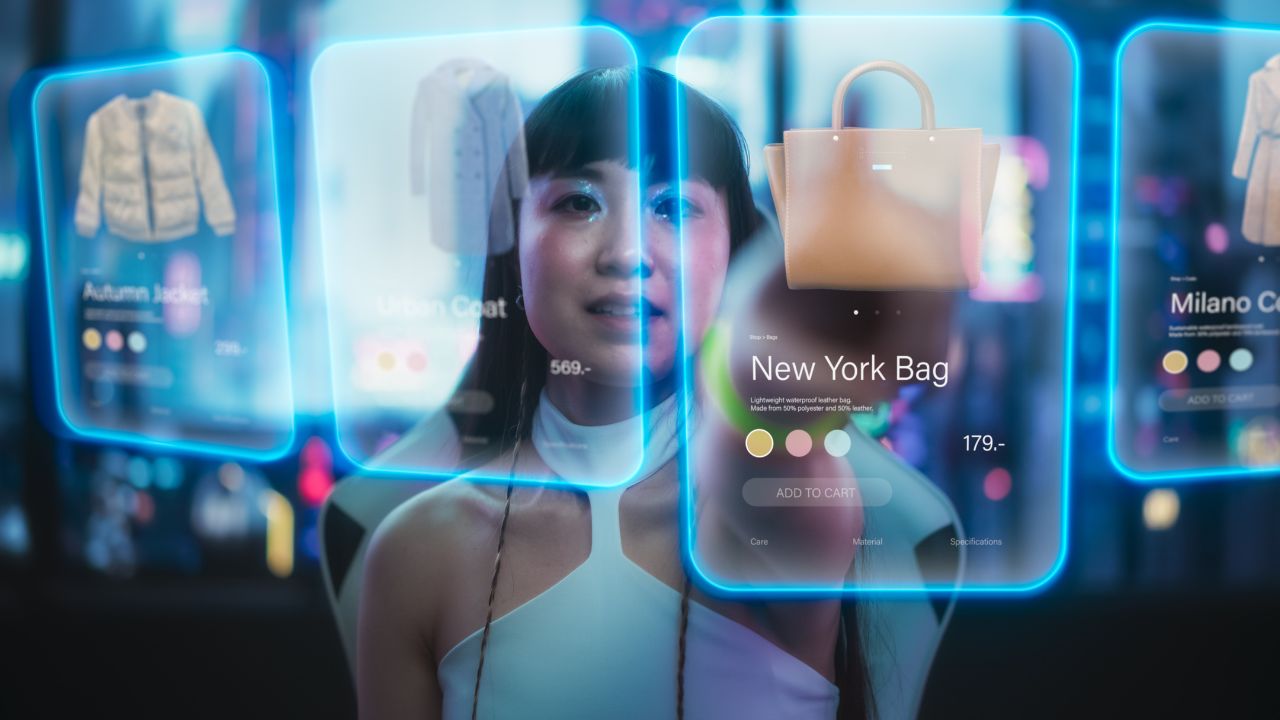
The world of retail looks very different today than it did 20 years ago. We’ve ditched shopping carts for digital baskets, cash registers for self-checkout machines, and cash for contactless payments.
But as we enter the age of AI, another shift is taking place in the retail space. The rise of generative AI and Large Language Models (LLMs) is changing how retailers interact with customers, manage sales, and market their products.
At the forefront of this shift are a series of retail AI companies that use the power of AI to enhance the shopping experience and offer innovative solutions and services for the retail industry.
How is AI used in retail?
AI is having a transformative impact on the world of retail, shaping how consumers interact with retailers and how businesses operate in the space.
Retailers can use AI to provide personalized shopping experiences, driving higher customer satisfaction and conversion rates while giving them crucial insight into demand and individual preferences supporting product development.

Many retailers are also using conversational AI chatbots in their online stores to provide instant assistance to customers anytime, anywhere.
These chatbots can handle questions about products, prices, store locations and return policies, and use customer data and purchase history to suggest relevant products and offers – increasing conversion rates.
They also cater to a global audience, breaking down language barriers and allowing retailers to reach a global audience they previously couldn’t access.
AI in retail supply chain management
Beyond the shop floor, AI is revolutionising supply chain management and forecasting for businesses across the retail sector.
Retailers can predictive analytics to estimate demand more precisely, helping to avoid concerns with overstocking or understocking and increasing customer satisfaction.
Many retailers are also using machine learning to capture the impact of hundreds of demand drivers for highly accurate demand forecasting, improving planning processes across merchandising, supply chains, and operations with visibility into future demand.
Top Retail AI Companies
There are thousands of retail AI companies developing solutions designed to help retailers improve the customer experience, increase conversion rates, and improve supply chain management.
Let’s explore ten of the top retail AI companies that are at the forefront of revolutionising the world of retail through the power of AI.
Mason
Founded by Barada Sahu and Kausambi Manjita, Mason is the world's first AI shopping Copilot designed to help direct-to-customer (D2C) brands skyrocket sales, cultivate loyalty, and create hyper-personalized shopping experiences. With over 50 AI-powered tools and playbooks, the company aims to bridge the gap between the customers and retailers by providing smaller and mid-sized brands with access to tools and expertise to analyze their customer data and gain insights. This includes website and app development, marketing automation, fulfilment solutions, and data analytics tools, which empower brands to build their online stores and manage their customer relationships directly.
Read: Reshaping the World of e-Commerce with Mason's Barada Sahu
Mason is critical of the current e-commerce landscape, which is dominated by large platforms like Amazon that charge high fees and limit control for brands. They advocate for a more decentralized and open e-commerce ecosystem where brands have more control over their data and customer relationships. Their AI tools and services empower brands to build their online stores and manage their customer relationships directly, reducing dependence on large platforms.
Oracle
Oracle is the software giant behind the Oracle Retail AI platform, which includes a host of solutions, for demand forecasting, price optimisation, and fraud prevention. The platform uses AI and machine learning algorithms to analyze sales data, market trends, and external factors to predict future demand with greater accuracy. It also product recommendations based on browsing history and purchase patterns, helping retailers achieve increased customer satisfaction, loyalty, and sales. When it comes to delivering stock, Oracle has retailers covered too. The company has partnered with Uber Direct to enable retailers to offer same-day delivery and returns to get customers their purchases faster while helping the retailer move merchandise more effectively.
As well as its retail AI platform, Oracle has a range of in-store AI-powered solutions that are redefining the physical retail experience. Oracle's self-checkout kiosks and voice-activated assistants, for instance, create faster and more convenient shopping experiences. Their cloud-based platform also fosters seamless integration between online and offline channels, ensuring consistent customer journeys across all touchpoints.
Bloomreach
Bloomreach is a major player in reshaping the retail landscape through its AI-powered solutions for personalized shopping experiences, optimized operations, and data-driven decision making. A visionary in Digital Experience Platform, the company provides an open and intelligent platform designed to build, personalise and drive traffic toward experiences sought out by clients. It uses AI and customer data to personalize every touchpoint, from targeted email campaigns and product recommendations to dynamic website content and social media interactions. Meanwhile, its AI-powered search engine understands customer intent and analyzes preferences to deliver relevant product results, reducing bounce rates and boosting conversions.
Bloomreach uses AI analytics to improve demand forecasting and inventory optimization, minimizing stockouts and surpluses.AI models predict future customer behaviour, trends, and potential issues, guiding marketing campaigns, product development, and resource allocation. Real-time dashboards and reports also provide retailers with actionable insights to optimize operations and make data-driven decisions.
Intel
You might know it for its powerful computer processes, but Intel is also a key player in the world of retail with a host of innovative AI solutions reshaping how we shop. The company's edge platform enable on-device processing of data, reducing reliance on centralized servers and minimizing latency. This is crucial for self-checkout kiosks across retail stores and powers the sensors and cameras on shelves that track product stock in real time and alert staff to restocking needs to prevent empty shelves and lost sales.
Intel collaborates with various AI software vendors and retailers to develop and deploy AI solutions tailored to specific retail needs. Examples of such partnerships include Intel's collaboration C3.ai to provide AI solutions for retail operations, customer engagement, and supply chain optimization. By providing the computational power, tools, and partnerships needed for AI development and deployment, Intel empowers retailers to unlock the potential of AI create a more personalized, efficient, and engaging shopping experience for customers.
Salesforce
Along with its integrated CRM, Salesforce’s Einstein AI help retailers create compelling commerce and marketing experiences at every moment of the customer journey. The tool uses customer data and machine learning to personalize communication across channels, including targeted product recommendations, dynamic content adjustments, and individualized marketing campaigns. Meanwhile, Einstein’s Predictive Scoring functionality allows it to analyse customer data to predict purchase behaviours and identify high-value customers, allowing retailers to tailor their strategies accordingly. Online retailers can also use Einstein conversational bots to handle repetitive customer inquiries, automate tasks, and offer 24/7 support, reducing the workload for sales agents and providing immediate assistance to customers.
For retailers with physical stores, Salesforce offers Einstein Vision to power smart cameras and sensors to analyze foot traffic, optimize store layout, personalize in-store displays, and detect potential inventory issues. Stores can also use Einstein voice Enables voice-activated assistants for self-service inquiries, product information access, and personalized recommendations, creating a frictionless in-store experience
Cresta
Cresta provides AI-powered solutions purpose-built to help retailers deliver personalized customer experiences and enhanced customer service. Cresta Insights, for instance, makes it easy for retail business leaders to quickly understand what customers are saying by identifying key trends, answering critical business questions, and uncovering hidden insights in every conversation. At the same time, the company’s conversational AI drives real-time coaching to help retail call centre teams follow best practices that are proven to convert by finding the perfect product or promotion based on customer interaction.
Watch: Generative AI Revolutionising the Contact Centre
For retail call centre managers, Cresta Director evaluates 100% of conversations and provides retail leaders with insights and coaching tools to coach and engage with agents effectively, cutting ramp time in half and increasing ESAT. This includes generating personalized scripts, product recommendations, and even email templates based on individual customer data and preferences to create a more engaging and relevant experience for customers.
NVIDIA
The graphics processing unit (GPU) maker NVIDIA is actively reshaping the retail landscape with its collection of AI-powered technologies and retail solutions. The Nvidia Omniverse, for example, allows retailers to create virtual showrooms and product simulations, enabling customers to virtually try on clothes, explore furniture arrangements in their homes, and personalize their shopping experience using NVIDIA's AR technology. Retailers can also use NVIDIA's AI algorithms to analyze customer data and purchase history to recommend relevant products, leading to increased sales and improved customer satisfaction.
As well as providing its own AI retail solutions, NVIDIA’s processors also power some of the leading retail technologies. NVIDIA's AI-powered DeepSpeed technology, for instance, is key to fast and accurate self-checkout for many self-checkout kiosks, reducing wait times and improving customer convenience for retailers around the world. Many retailers also rely on NVIDIA's AI algorithms to track inventory levels, predict demand, and optimize stock management, minimizing losses and ensuring product availability.
Microsoft
From optimizing the space and layout of stores to selecting optimal product ranges, and delivering customer shopping recommendations to loyal customers, Microsoft is helping retailers see huge increases in conversion by leveraging AI and effective data analysis. Its Dynamics 365 Supply Chain Management, for instance, leverages AI to optimize inventory levels, predict demand, and automate scheduling for logistics and warehouse operations, improving efficiency and reducing costs. Meanwhile, self-checkouts, sensors and cameras powered by Azure IoT gather data on in-store traffic, product locations, and equipment performance, enabling AI to optimize store layout, staffing, and maintenance schedules.
A leader in the AI space and a big investor in generative AI, Microsoft’s powerful AI technologies are changing retail by personalising customer journeys, store operations, and business intelligence. The Power BI platform provides retailers with real-time insights and visualizations from their data, enabling informed decision-making about pricing, product assortment, marketing campaigns, and store operations. And with Azure ML, retailers can build and deploy custom AI models for various tasks, like predicting customer churn, identifying fraudulent transactions, and analyzing customer behaviour from social media.
C3.ai
C3.ai is driving innovation in the retail AI space through a range of AI-powered solutions purpose-built to optimize operations, personalize customer experiences, and improve decision-making for retailers. The company’s AI platform analyzes vast amounts of data from internal and external sources to monitor retail trends, customer behaviour, and complaints. This helps predict future demand with high accuracy, allowing retailers to optimize inventory levels, minimize stockouts and surpluses, and ensure product availability when needed. The platform also analyzes data from across the supply chain, identifying bottlenecks and optimizing logistics operations to improve efficiency and reduce transportation costs.
With C3, AI, retailers can reduce inventory holding costs, improve cash flow and supply chain visibility, and increase the productivity of inventory analysts. C3 AI Inventory Optimization applies advanced machine learning to analyze variability in demand, supplier delivery times, and quality issues to build real-time recommendations and monitoring, so stores can set optimization by confidence level and receive real-time notifications and root-cause analysis.
Trigo
Trigo is a computer vision company that uses AI-powered infrastructure to help retailers achieve frictionless checkout and deliver data insights that drive revenue and enhance store operations. Trigo's key technology uses a camera-based system that tracks shoppers and products in real-time, automatically charging them as they walk out of the store. This eliminates the need for checkout lines, saving customers time and frustration, helping brick-and-mortar grocery retailers integrate the efficiencies and insights of digital commerce into the physical world.
With no queues or scanning, Trigo offers a seamless and convenient shopping experience, increasing customer satisfaction and potentially boosting spending. Imagine grabbing what you need and simply walking out, the bill charged directly to your linked account. The system also benefits retailers by reducing labour costs associated with staffing checkout lanes. Additionally, data insights from shopper movements can inform store layout optimization and inventory management. Trigo is exploring ways to personalize the shopping experience based on individual customer data. Data collected by Trigo’s systems could help retailers make consumers happier, reformulate operations, and remodel marketing by feeding new insights into their core capabilities.












